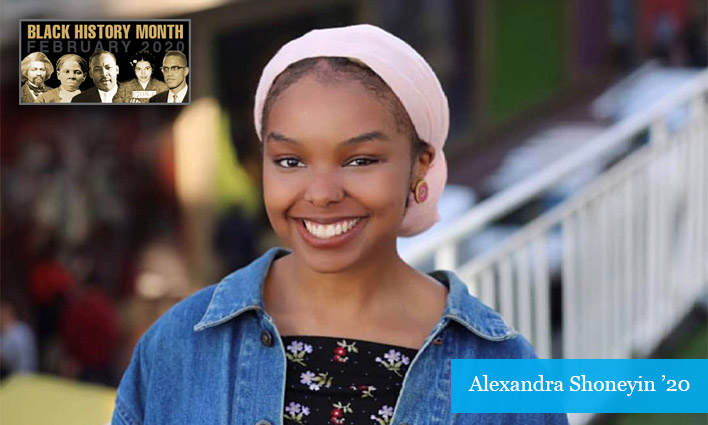
In celebration of Black History Month, our entire community is recognizing the incredible achievements and contributions African-Americans have made to this country. Aiming for a future that fully embodies the dream of Dr. Martin Luther King, Jr., we’re also applauding the work our students, faculty, staff, and alumni are doing to continue this proud legacy. The College is hosting a series of events during the month of February exploring the African-American experience, its history, and its impact on culture; including Education Emcees: Hip Hop and Community Building; AfroLatinidad; and an African-American Military Heritage Luncheon. The month-long celebration culminates with the 30th Malcolm/King Awards Breakfast on February 28, which honors the legacy of Malcolm X and Dr. Martin Luther King, Jr., and recognizes the intellect and determination of our student award winners.
In anticipation of the Malcolm/King Awards Breakfast, we spoke with this year’s award winners to understand what Black History Month means to them and to learn how they hope to advance the work of the African-American leaders that have come before them. The final student in our series is Alexandra Shoneyin ’20, a Macaulay Honors student pursuing her CUNY Bachelor of Arts degree in Critical Theory and Visual Studies, who has hopes of creating positive changes in communities—especially African-American communities—through teaching and the creative arts.
February is Black History Month. What does it mean to you to celebrate the many achievements generations of African-Americans have accomplished?
To celebrate Black History Month means to honor African ancestry, recover lost African-American history, and reimagine a new, healed, and liberated society for this current generation of African-Americans and those to come.
“To celebrate Black History Month means to honor African ancestry, recover lost African-American history, and reimagine a new, healed, and liberated society for this current generation of African-Americans and those to come.” —Alexandra Shoneyin
What goals do you have for advancing equality and fairness for all people, especially African-Americans?
I want all people, but specifically African-Americans, to understand the superficial reality years of institutional and systemic racism has created for us. African-Americans have experienced a deep-rooted collective pain that stemmed from our ancestors being violently uprooted from their homes and sold into mental and physical submission. Because of this, both the victims and perpetrators of this violence have suffered extreme consequences. The freedom and liberation I want for my African-American brothers and sisters rests in obtaining the true reality and potential of our being, one that transcends race. This is not meant to deny the reality of our oppression or to negate feelings of anger, pain, or outrage, but to shift our mentality from victims to victors. We cannot change the years of maltreatment our ancestors were forced to endure and the ways in which that abuse continues to exist in our laws, society, personal interactions. We can change our relation to it.
When you think of African-American history, what makes you the proudest?
What makes me the proudest of African-American history is the ways in which slaves continued to remain vibrant, spiritual, and experience joy in the midst of suffering and pain. It amazes me how African-Americans produced sacred and beautiful things from such a horrifying time-period, whether it be negro spirituals that came from the south, or community education centers that spread throughout the west coast.
If you could talk to Malcolm X or Dr. Martin Luther King, Jr., what would you ask them? What would you want to say to them?
If I could talk to Malcolm X or Dr. King, I would ask them both what motivated them to continue to fight for the liberation of African-Americans, in spite of adversaries. And is it important to unite our struggles with the global black community?
“Receiving the Malcolm/King Award encourages me to explore unconventional forms of activism—such as film, art, spirituality, and music—to create long-lasting change in communities and society.” —Alexandra Shoneyin
What does it mean to you receiving the Malcolm/King Award?
Receiving the Malcolm/King Award is a great honor and encourages me to continue to redefine how activism is commonly practiced and explore unconventional forms of activism—such as film, art, spirituality, and music—to create long-lasting change in communities and society.
If everything goes according to plan, where do you see yourself in 10 years?
If everything goes according to plan, in the future, I want to create innovative, accessible, Afro-centric, and diverse spaces for racially marginalized groups in the United States and for the global black community.



